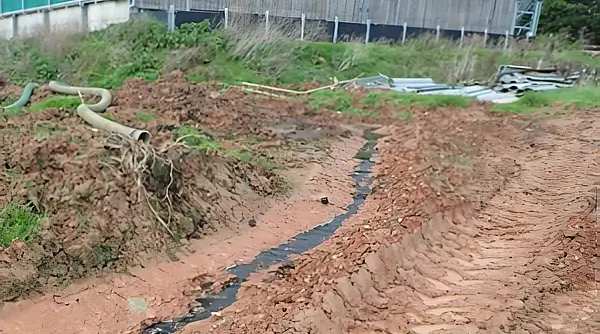The Environment Agency (EA) is urging UK farmers to prepare for winter slurry storage, emphasizing the importance of adequate capacity and contingency plans amid changing weather patterns.
This proactive approach aims to ensure compliance with environmental regulations, protect water quality, and support farm profitability.
Preparing for Winter: Essential Steps for Farmers
As the UK faces increasingly erratic weather patterns, the Environment Agency’s Winter Ready campaign highlights the need for farmers to plan ahead.
With wetter winters and drier summers becoming more common, having six months of slurry storage is crucial. This ensures compliance with Farming Rules for Water and prevents spreading in unsuitable conditions.
Farmers are advised to cover slurry tanks and lagoons to prevent rainwater from mixing with slurry, which can increase volume.
Maintaining proper drainage systems is also essential to manage excess water effectively. The EA provides support through local officers and the National Customer Contact Centre.
Practical Solutions for Slurry Management
- Ensure six months of slurry storage capacity
- Cover tanks and lagoons to reduce rainwater contamination
- Maintain drainage systems to manage excess water
- Avoid taking sludge or digestate without immediate need
- Seek advice from Catchment Sensitive Farming advisors
Government Support and Grants Available
The UK government offers capital grants for improving slurry infrastructure, including store covers, roofing, concrete yards, and drainage systems. These grants aim to help farmers adapt their practices while reducing pollution risks.
Additionally, Catchment Sensitive Farming advisors provide on-farm visits and tailored advice to optimize slurry management.
A Broader Environmental Strategy
This initiative aligns with previous efforts like the 2019 Clean Air Strategy, which mandates covering all slurry stores by 2027 to reduce ammonia emissions. The government’s £74 million grant scheme supports these goals by funding infrastructure improvements that enhance environmental compliance.
Protecting Communities and Ecosystems
Effective slurry management has significant implications for rural communities by safeguarding drinking water sources and protecting local wildlife.
For farmers, adapting infrastructure may incur costs but also offers long-term benefits through improved soil fertility and crop yields.
Additional Reading
Something to Ponder
The Environment Agency’s Winter Ready campaign underscores the importance of proactive planning in managing agricultural waste effectively.
By preparing now, farmers can mitigate potential environmental impacts while ensuring compliance with regulations—ultimately benefiting both their operations and surrounding communities.
Discover more of More of Todays Top Breaking Government News Stories!
Sources: UK Government, Met Office, Environment Agency, and Department for Environment Food & Rural Affairs (Defra).
Prepared by Ivan Alexander Golden, Founder of THX News™, an independent news organization delivering timely insights from global official sources. Combines AI-analyzed research with human-edited accuracy and context.








